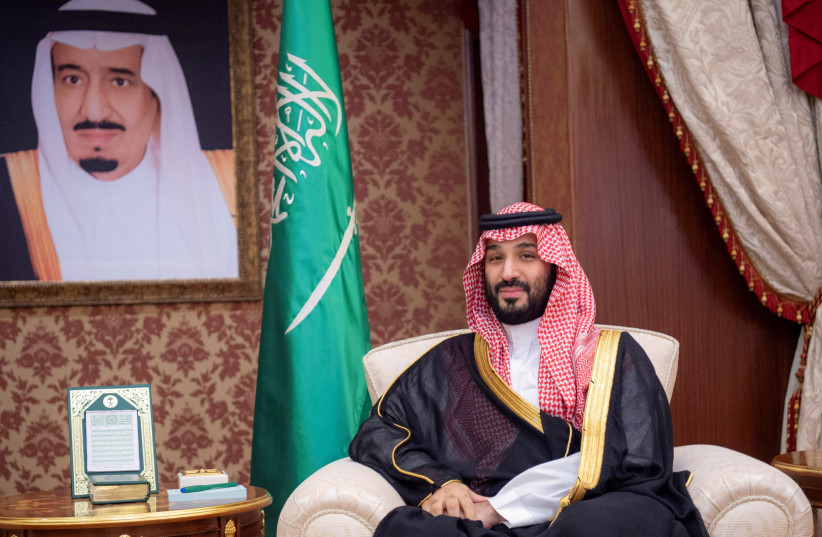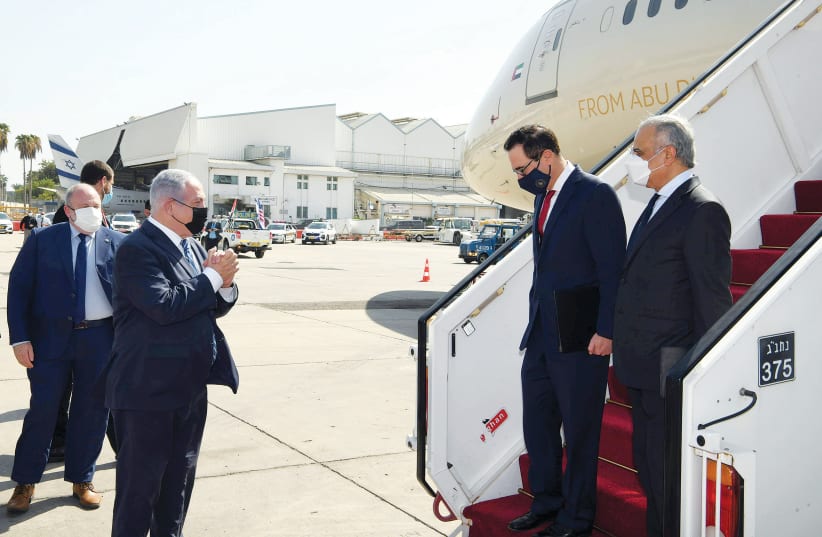Intelligence reports show that Hamas’s assault on Israel on October 7 was prepared over several years, with active support and guidance from Iran. The timing of the attack was motivated, to some extent, by the rapid advances in the US-led normalization process between Israel and Saudi Arabia in the weeks preceding the attack. Such a normalization could undermine the goals of both Hamas and the Iranian regime, who realized that a normalization pact would stymie their efforts to delegitimize and ultimately destroy Israel. For now, it seems their plot has partially succeeded; the normalization process came to a screeching halt and there are growing signs of tension and irritation among the Arab signatories of the Abraham Accords (the UAE, Bahrain, and Morocco) that may lead to the collapse of these agreements or their deterioration to the “cold peace” that describes relations between Israel and two of its other peace partners – Egypt and Jordan.
While the war in Gaza rages on, it is not too early for the Biden administration to consider how can it best respond to efforts aimed to derail one of its most ambitious strategic moves – expanding the circle of Arab nations that want regional peace. The US accomplished this initially by standing firmly by Israel, providing it with much needed military and financial aid, and defending it in the UN and other international bodies. This did not go unnoticed by America’s Arab allies.
But will this be enough to revive the normalization effort? Probably not. There are other possible moves similar to those taken by the US soon after WWII. This would include launching a Marshall plan equivalent to address the civilian needs of Gaza, similar to the US assistance granted to western Europe, which was largely ruined by that time. This could also include creating a Middle East NATO equivalent to address the security threat posed by Iran, similar to the way a multilateral organization was created to counter the USSR after WWII.
How can the US make good use of the war in Gaza?
In short, the US must leverage the current situation to prevent the Abraham Accords from falling apart, and to strengthen them. A key way to accomplish this would be to add Saudi Arabia as another major player to these accords. All of this is possible if the administration pursues a combined Marshall-NATO-like strategy in the Middle East.
On the civilian side – the Gaza strip has suffered unprecedented damage. When the war ends, it might be totally devastated. Israel has stated repeatedly that it does not want to stay in Gaza as an occupying force, or to run the lives of the 2.2 million people living there. That would be a recipe for disaster. At the same time, Israel has rejected American proposals that a “revitalized” Palestinian Authority (PA) could be charged with running post-war Gaza. Indeed, Israel has no faith in the PA, an entity that pays monthly stipends to families of terrorists and promotes terror in its educational system. Unfortunately, Egypt has refused to take ownership of the future of Gaza. So, who will take the keys and run the place for a long enough horizon until some stability is achieved?


A promising option is a multi-national coalition, comprised of the Arab signatories of the Abraham Accords, with Saudi Arabia as a possible leader of this effort, with generous support from the US and the Europeans. Israel would agree to such a solution if it takes into account Israeli security considerations. First, Gaza must be totally demilitarized. And second, the IDF must be enabled to operate in Gaza when threats are identified (just as it currently operates in Judea and Samaria).
But such an effort cannot be limited to Gaza. This new coalition must block further expansion of the Iranian regime and its proxies. A coalition led by the Abraham Accords partners along with the Saudis, US, UK, and possibly other Western countries, could begin by removing the threat posed by the rough Houthi regime in Northern Yemen. Since the war in Gaza began, the Houthis have been firing armed UAVs and missiles towards Israel. In recent weeks, they have also struck a British cargo ship, took over another ship run by a Japanese crew, and fired at US Naval vessels. But Israel and international ships are only recent targets. In the last few years, they have fired rockets and missiles at Saudi Arabia and the UAE, causing some casualties and creating significant damage to strategic infrastructure. In other words, all parties involved want to eliminate this threat. After that, the coalition would need to determine which of Iran’s other proxies must be targeted. The Iran-backed militias in Iraq and Syria are far less formidable than the Lebanese Hezbollah. But they must all be dealt with at some point.
This proposed coalition reflects the interests of the parties involved, helps solidify the Abraham Accords, and makes them meaningful in the long run. The coalition should also strive to include Egypt and Jordan. Egypt must take an active role, alongside with Israel, in securing the passage of goods in and out of Gaza, while ensuring that such transports do not include weapons or ammunition. Jordan must similarly be involved in preventing the smuggling of weapons to violent Iranian proxies that seek to destabilize the area. Making these two countries active partners in this strategy is important towards protecting the peace treaties they have with Israel, while also solidifying their strategic relations with the United States.
It must be noted that a total victory over Hamas is essential to enact this plan. Indeed, the Marshall plan could not have been enacted before the Allies achieved a total victory over the Nazi regime. Leaving remnants of Hamas in place is a recipe for future failure.
Finally, let’s not ignore another big shadow looming at the outskirts of the Middle East – China. US President Joe Biden’s vision to construct a railway and pipeline that will connect the Gulf States to Israel via Saudi Arabia and Jordan was aimed to be the US countermeasure to China’s ambitious “road & belt” plan. Letting the normalization process die will not only be a great prize to Iran and its proxies, it will also be a huge blessing to China.
Lt.-Col. (res.) Boaz Golany is a Professor at the Technion, Israel Institute of Technology where he has served as a dean, VP for External Relations & Resource Development and executive VP & director general. His research interests cover diverse areas of applied Operations Research. He also serves as a Board member and consultant to some companies and organizations. Brig.-Gen. (res.) Jacob Nagel is a senior fellow at the Foundation for Defense of Democracies (FDD) and a visiting professor at the Technion. He previously served as Prime Minister Benjamin Netanyahu’s national security advisor and the head of Israel National Security Council (acting).
